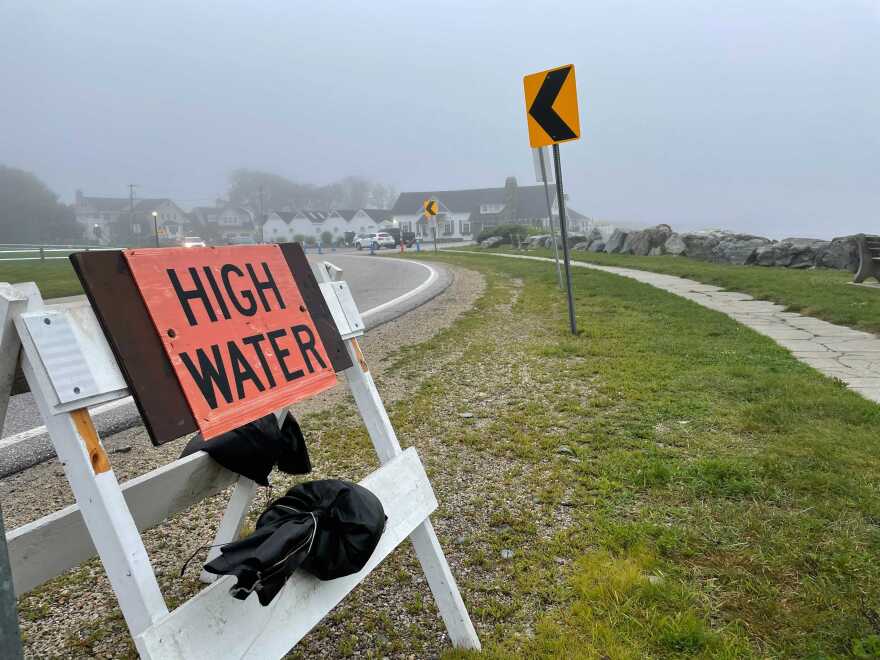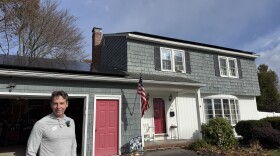The COVID-19 pandemic prompted massive, quick changes for many of us. Almost overnight, businesses closed, travel was limited and wearing face masks became much more normal. The speed of those changes made climate activists think: Maybe human beings can make big changes.
Susanne Moser has been thinking about what our behavior in response to the pandemic says about our behavior related to climate change. She’s a human geographer who specializes in psychological responses to climate change and a member of the research faculty in the Environmental Studies Department at Antioch University in Keene. Moser talked with All Things Considered host Peter Biello about what our adaptations to life in the era of COVID-19 say about our ability to combat climate change.
Over the next few weeks, we'll be gathering your stories and thoughts on this issue. For our next Big Question we're asking: "What are you doing to fight climate change?"
We'll share what you tell us and learn more about what we're all doing in the face of this challenge. Call us, email us, or record your voice on the NHPR app. You can get all the details here.
Below is a transcript of their conversation.
Peter Biello: Susanne, there was some hope at the start of the pandemic with respect to climate change and how quickly people's behavior can change in theory, because, as a result of COVID, there were fewer cars on the road, fewer planes in the sky. The air cleared up dramatically in some parts of the world. What did the pandemic show you about what's possible when it comes to changing human behavior, when people feel it's necessary?
Susanne Moser: For all the time we have spoken about, we can't act fast on climate change, you know, another existential threat, in fact, a much bigger existential threat compared to COVID, the pandemic showed us we can. And so in the climate community, there was actually quite a shift in thinking and hope, if you will, that maybe we can turn this ship around much faster than conventional wisdom would have you. Now, having said that, we also, you know, see, now it's dragging on for a long time with COVID. People get lax. The masks are not covering mouth and nose. People do not want to social distance anymore. So, it's very difficult actually to stick with a hard program, if you will, to make a change for a long period of time, especially when you know it looks like we're all doing better. We have now a way to protect ourselves with the vaccine. And yet, we're not all doing it. It's become polarized, just as it has in climate change. And so social change is actually really, really hard to pull off.
Peter Biello: So, you're referring to some extent of the fatigue that people are feeling about the COVID safety measures that we've had to take. The biggest example being fatigue about masks, people being frustrated about masks. Are we seeing something similar when it comes to climate change? Because of course, we've been talking about climate change for years longer than we've been talking about COVID. Is there a similar kind of fatigue happening with respect to climate change?
Susanne Moser: Well, there are all kinds of fatigues actually around climate change. One is with the conversation at all. People don't want to talk about it necessarily. There is a fatigue around that we actually call "climate fatigue" or "compassion fatigue" around looking at one disaster after another. And this is not just climate disasters, it's really the combination of all disasters we currently experience. And that just makes it really, really hard to stay empathetic about what's happening to other people, what's happening to our neighbors. We get more frustrated easily. We get burnt out.
There is a fatigue among people who face this issue of climate change professionally every single day, and they have to look at the data. They have to do whatever they can to help prepare and protect their communities. And it's hard, hard work, so burnout is a real issue. The emotional side of that is a big, big component. And you know, if you think about it, climate change will be with us for hundreds and, in some instances, for thousands of years. The kinds of changes we have set in motion, and this is really hard to understand for a lot of people, is for all intents and purposes, just permanent. It's forever. We will never see again what we've seen or what we lived and thought as normal in the past.
Peter Biello: So, what does it take, in your view, to make more people care about climate change, especially when a lot of the biggest disasters we hear of, at least here in New Hampshire, you know, wildfires in the West, flooding in Louisiana. How do you make people care?
Susanne Moser: Well, your question starts from the premise that caring about the issue is the only way we're going to get to action. I would say that's not really true.
Peter Biello: I would never suggest that as a premise. I mean, but as individuals, I mean, of course, we can push politically to make sure that that that politicians are doing things that we think are wise for our planet. But, to some extent, democracy starts with people caring. And so what can people do to care?
Susanne Moser: Well, the things that make us care are the things we love and the things that are really, really close in. You know, something that touches us every single day, affects us every single day. If you have to show up for work, if you have to get your kids to school, you care about what kind of education they get, right? You care what safety is happening in school. So, the things we truly, truly care about are the things that keep us alive, the food on our table, those are the things that ultimately will get people to really, really care.
Now what's important is that care then gets translated into action because we might very quickly grasp the vastness of this change that we have set in motion with the climate crisis and just feel like, well, I don't know what to do about that. And you know, who am I as a single person vis-a-vis such a global issue? And if we don't have an answer to that question, then we just simply go numb. It's too hard to bear an existential threat to ourselves when we don't have a manifest answer that will make a difference. So we need to connect with others to do things together. We need to act politically. We need to pressure our businesses and industry. Those are the kinds of things that will set bigger changes in motion.
Peter Biello: Have your observations about the pandemic and what it has revealed about human nature made you feel a certain way about human beings' ability to cope with or adapt to climate change?
Susanne Moser: It's made it very, very clear to me how important it is for us to connect socially. The very thing that was made so difficult during the pandemic, and the reason I say that is when push comes to shove, when things get hard, who do you look to find out what's real, what you should be doing, what others are doing? You look to the people you trust. And that social connectivity, that is probably the deepest source of both our psychological resilience, our resilience as a community.
When government breaks down, when structures break down that are meant to support us, who we look to is another human being that can help us or whom we can help. So making connections and really, you know, making sure that those communities know what it is they can do both to prepare themselves and to reduce their own impact on the environment, that is where we need to infuse. That's how we approach. Not one person at a time, one actor alone, but us together. This is way too big for us to face alone. So to me, that is what COVID showed us so clearly how, God, how hard it is to be isolated and to not have that connectivity. So, if there's anything that we can do to help keep that and foster that, sustain that and nourish it, grow it, even that will help us get through.
Peter Biello: Susanne Moser is a human geographer who specializes in psychological responses to climate change, and she's a member of the research faculty in the Environmental Studies Department at Antioch University in Keene. Thank you very much for speaking with me.
Susanne Moser: It's a pleasure. Thank you.









